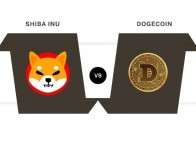
The Key Differences Between NFTs and Cryptocurrencies
Oct 3, 2023, 5:58PMVirtual spaces, such as the Metaverse and Web3, bring novel concepts for lovers of virtual assets with an increasing presence in our environment.
However, as is often the case with all innovations, having an apparent idea of these assets and their main differences can become confusing.
An example of this are cryptocurrencies and the famous Tokens or NFTs. Surely you have heard of these or even known someone who has invested in such assets. If you noticed a media boom about NFTs, they have become a new financial attraction for investors. However, they should not be confused with cryptocurrencies, such as Ethereum or Bitcoin.
Do you know the difference between the two? Do you see the utility you can give to each one? Do you know how to be part of our financial environment? These are some of the questions we will answer for you below.
What Is An NFT?
An NFT (Non-Fungible Token ) is a virtual asset representing something unrepeatable and unique, such as a work of art or a collector's item. They work as a virtual certificate proving that digital object's ownership, thus making it a precious and exclusive asset. For example, an NFT can be a simple image or video only in digital format, and only the owner has the power to possess it.
These digital assets can be obtained through NFT markets and blockchain platforms, opening up infinite possibilities. Likewise, this asset can be transferred from one owner to another through blockchain technology, which creates a virtual trail from the buyer to the seller that confirms the operation. Using the blockchain encodes the buyer's unique property rights to the new owner.
The evolution of NFTs has begun with virtual works of art, but the application of this type of technology to our daily lives is getting closer. A user's certificate, title, or property can be considered an NFT. Things like photos, concert tickets, college degrees, real estate deeds, or shares in a company could also be considered an NTF.
The possibilities are endless thanks to blockchain technology's certificate of authenticity to an NFT.
What Is A Cryptocurrency?
A cryptocurrency is a virtual currency that uses blockchain technology to function. We can use crypto as a means of exchange and payment, similar to any other classic money because this financial asset only exists virtually. In addition, it uses cryptography to guarantee the security and protection of operations.
Unlike NFTs, cryptocurrencies are often regulated by the government and are used to process financial transactions. The reason behind this is that cryptocurrencies are meant to store a unit of value, spawning complex trades and transactions that oftentimes require external guidance. Reputable crypto websites, such as cryptocurrencyhelp.com, analyze the latest policies around digital assets, and of course, the regulation scene is ever-changing, with governments constantly shifting licensing and disclosure obligations for crypto owners.
Bitcoin, Ethereum, Dogecoin, and Litecoin are just a few examples of famous cryptocurrencies. Users decide to invest in these not only to make payments but also as an excellent form of investment since their price usually varies depending on their purchase, as happens with a share on the stock market. We can purchase them through cryptocurrency exchanges such as Binance, Bit2Me, or Bitifinex.
Two Digital Assets Based on Blockchain Technology
Both cryptocurrencies and NFTs are virtual assets based on blockchain technology, like a virtual book where you can find saved data with a practically unfalsifiable structure. This technology allows users to keep their data and the data of their assets most securely. Blockchain is their main similarity, but what makes them different assets?
Main Differences Between NFTs and Cryptocurrencies
Keep in mind that NFTs are not the same as cryptocurrencies. NFTs can use cryptocurrencies to perform a transaction within the same blockchain technology. But NFTs are set up differently.
While a cryptocurrency can be exchanged or traded for its price, NFTs cannot. Since each cryptographic asset has a unique identification code, they use metadata that distinguishes one digital asset from another. We can exchange one Bitcoin for another since these retain their exact equivalence, but NFTs don't trade like that.
NFTs are often traded and distributed through online marketplaces. Investors browse an inventory of assets before choosing one to buy. NFTs are currently sold with cryptocurrencies such as Polygon, Solana, and Ethereum, although we can expect more cryptocurrencies to trade.
The NFTs have presented a new way for artists, athletes, celebrities, and companies to profit thanks to enhancing their image and economic assets. Every day, brands capitalize on their identities, and several NFTs have been sold for thousands, even millions, of dollars.
How to Trade with NFTs
First, you should know you can only acquire an NFT with a cryptocurrency account. So we first must obtain the virtual currency necessary for the operation through platforms such as Binance, Robinhood, or Coinbase. After that, you must link your crypto wallet with access to the market you will use to start buying NFTs.
Experts recommend browsing online marketplaces where NFT sales and auctions occur and paying attention to upcoming release dates, as many tend to sell out quickly. After purchasing the asset, the main idea is to store the NFTs or exchange them after a while, looking to profit with another trader looking for a unique item in the market.
Disclaimer: information contained herein is provided without considering your personal circumstances, therefore should not be construed as financial advice, investment recommendation or an offer of, or solicitation for, any transactions in cryptocurrencies.

















